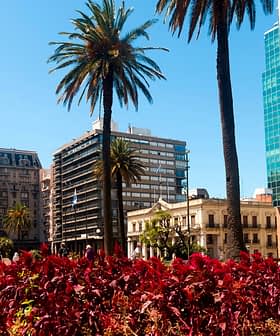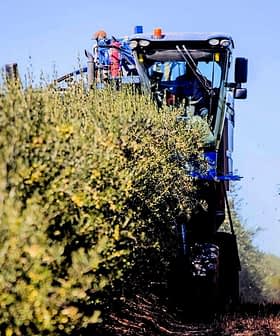'Sabor Oliva' Joins Uruguayan Producers and Public
Fewer producers attended this year's edition, but spirits were high among attendees. After a disastrous 2018 harvest, producers say they are hoping to set a record in the next campaign.
At a sleek hotel, flanked with imported palm trees and situated a couple hundred yards away from the Rio de la Plata, about 600 guests gathered over the course of a weekday evening to sample and celebrate Uruguayan extra virgin olive oil.
Quality is the only way we can compete with larger producers, such as Argentina, but we cannot compete in volume.
Uruguay’s olive oil sector has just entered its fifteenth harvest season and there was a sense of optimism among the producers at the fourth edition of Sabor Oliva, which is organized by the Uruguayan Olive Association (ASOLUR) and Sin Pretensiones, a local restaurant.
Six of the eight major producers in attendance told Olive Oil Times that they were confident about having a record harvest next autumn (which is in April and May in the Southern Hemisphere).
“Yes, I am optimistic,” Martín Robaina Antía, the commercial manager at Lote8, told Olive Oil Times. “The quality is high and production should also be up. I think 2019 will be a very good year.”
Lote8 is one of the larger producers in Uruguay. The company harvests five different varieties of olives from 40,000 trees. Robaina Antía boasts about the success of his brand as consumers come up and sample various oils that are on display.
Lote8’s Picholine took home a Gold award at the 2017 NYIOOC World Olive Oil Competition. They have also won awards in Argentina, California and Italy. In the 2018 NYIOOC, the only Uruguayan winner was O’33 José Ignacio.
However, even as producers and consumers celebrated the anniversary with typical Uruguayan foods and local wines, the event seemed to partially be papering over the cracks of some of the sector’s immediate problems.
Only eight of ASOLUR’s 30 commercial producers were in attendance this year. Back in 2016, the event drew about 20 producers. Part of this absence could be explained by the devastatingly low harvest that Uruguay experienced this year.
“This year, it was a very poor harvest. All around Uruguay, most of the plantations had the worst harvest in years,” Ernesto Singer, an olive oil producer at Tupercí, told Olive Oil Times.
An extremely hot winter in 2017 meant that many trees could not go dormant for the necessary time to produce fruit. This, coupled with a late cold spell, too much rain during the spring and hail, meant just about every producer in the country had a disappointing year.
Each of the six producers interviewed by Olive Oil Times at the event said they had experienced losses of anywhere between 50 and 70 percent of their yields.
Most of the producers said they either produced just enough to get by or blended this year’s oil yield with last year’s.
“I was able to produce some oil this year and I still had some oil from 2017, which was a great year for us. We had some extraordinary oils,” Singer said. “Some of them we kept in the best possible conditions and made blends with the current oil. That’s how we plan to get through this year.”
The differences between the producers who were in attendance and those who were not are quite large, according to Sergio Gómez, a production advisor at Olivonoble Services. Gómez has helped harvest olives and produce olive oil on five different continents and told Olive Oil Times that many newer producers were unprepared for the financial burden that starting an olive grove takes in Uruguay.
“Some producers don’t understand the scope of the investment,” he said. “Years one to five require major investments with little payoff. After the eighth year, you start to make a profit.”
The five largest producers in Uruguay currently account for 70 percent of the country’s planted olive trees. The remaining commercial producers make up the remaining 30 percent.
“That is the reality of the sector,” Jorge Pereira, a professor of genetics at the University of the Republic’s Agronomy School, olive oil sommelier and consultant, told Olive Oil Times. “Uruguay is in a very difficult moment.”
“The economic moment for agriculture complicates oliviculture,” Pereira added. “Right now, profits and harvests are low.”
The cost of fuel and electricity, an increase in taxes along with a bloated national budget and bureaucracy have all made farming less profitable than it was just a few years ago. In January, mass protests against the government erupted across the countryside demanding that something be done. Uruguay’s Minister of Agriculture resigned in the aftermath.
In spite of this economic uncertainty, Gómez, who helps producers with every step of the olive oil production process from picking the correct location to pruning the trees and milling the oil, sees a lot of potential in Uruguay to expand production and increase quality.
“Consumption in Uruguay is growing,” he said. “When I arrived in 2002, it was 250 grams per capita and now it is 320 grams per capita.”
“Uruguay has potential,” he added. “When everyone is on the same page with management the only thing that will be out of their hands is the weather.”
The small South American country, which has a population of just under four million, already has almost 25,000 acres of olive trees planted. Next year’s production is estimated to be about 1,860 tons, up from this year’s dismal 558 tons.
Some producers are planning on expanding their groves, but just about all realize that their end game will be increasing quality.
“We have a small quantity of production, but very high quality,” Paula Ferrera, a representative from ASOLUR, told Olive Oil Times. “Quality is the only way we can compete with larger producers, such as Argentina, but we cannot compete in volume.”
This sentiment was echoed various times throughout the evening. Speaking with consumers and to each other about the prospects of the Uruguayan olive oil sector seemed to alleviate some of the feelings of apprehension regarding the weather and this year’s poor harvest.
Jorge Serrano has been producing olive oil in Uruguay for eight years. This year, his harvest was 70 percent lower than it was last year, but he managed to win a gold award for what little extra virgin olive oil he had at a competition in Chile.
He smiled and summed up the night this way: “You have to have optimism in this business if you want to keep going. If everything goes well the olive oil comes out well.”





